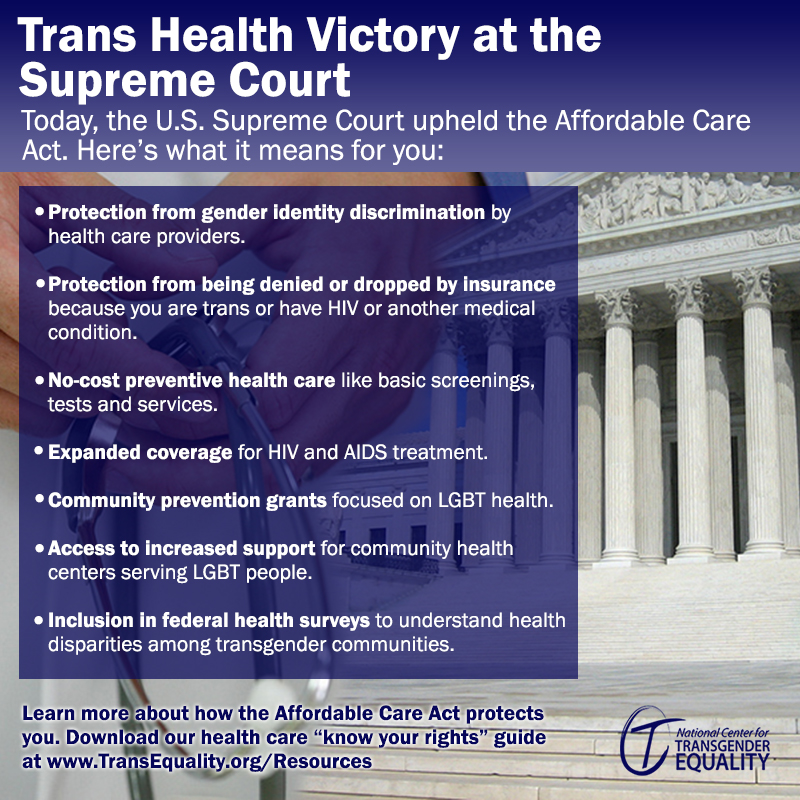Trans Americans Celebrate Health Care Victory at the Court

In response to today's landmark Supreme Court decision upholding the Affordable Care Act, NCTE issued the following statement.
Decision Affirms Ban on Cancelling Care for Trans People and People Who Are HIV+ The nation's leading organizations advocating on behalf of transgender people celebrate the ruling and express strong support for implementation of the law's key protections over the next two years. Today the United States Supreme Court delivered a huge victory to nationwide efforts to establish a health care system that works for everyone, including transgender communities and the 1.2 million people living with HIV/AIDS in the United States. By upholding the Affordable Care Act (ACA), today's decision delivers on the promise of health care for more than 30 million uninsured Americans. In response to the U.S. Supreme Court's health care decision, NCTE Executive Director Mara Keisling said, "the Supreme Court's decision is a historic ruling affirming a historic law."
Today's ruling upholds critical protections for transgender people and their families. We celebrate this ruling and the benefits it will have in improving access to quality, affordable health care for transgender people without discrimination. There is no doubt that this law will hugely benefit transgender people and all people in the coming years. This is an important victory for transgender people and their families. The law addresses many of the most pressing problems impacting the health of transgender people and their access to quality care, including financial barriers to insurance coverage and to preventive health care, and discrimination in the insurance market and by health care providers. Keisling said, "All the time, people tell me that their health care coverage has been dropped or cancelled because they are trans or are living with HIV. Others tell me about doctors who refused to see them because they are trans. Fortunately, the Court looked at the health of our country with fairness and upheld the law ending the practice of cancelling or dropping coverage for pre-existing conditions and allowing other key provisions to take effect." The preservation of the ACA is the best possible outcome for LGBT communities. According to Secretary Sebelius, LGBT people "face numerous barriers to health-from providers who don't understand their unique health needs to difficulty getting health insurance because they can't get coverage through a partner or spouse. And unfortunately, throughout our country many LGBT individuals still face discrimination and bigotry in the health care system." Fortunately, she notes, "the Affordable Care Act may represent the strongest foundation we have ever created to begin closing LGBT health disparities." The law for the first time prohibits gender-based discrimination by most health care providers - a ban that extends to discrimination based on gender identity and gender stereotypes, and thus provides critical protection for LGBT people. The law will also prohibit insurers from denying or canceling insurance because a person is transgender or has HIV or another medical condition. It will provide premium credits and expanded Medicaid eligibility to enable many individuals and families to obtain insurance for the first time. The law requires plans to cover a range of key services, and prohibits co-pays for many routine tests and other preventive care. The law includes several provisions that can improve the health and well-being of LGBT older adults, such as strengthening Medicare, expanding Medicaid, improving community long-term services and supports, and providing additional elder abuse and nursing home transparency protections. And the law has tremendous potential to impact the fight against HIV/AIDS, which is still a major transgender health crisis, by expanding access to testing and treatment and supportive community prevention efforts The law is a milestone achievement in the long pursuit of LGBT health equity. We applaud the Court's ruling and we will continue working with HHS as the law is fully implemented.

